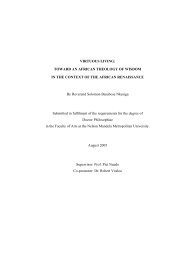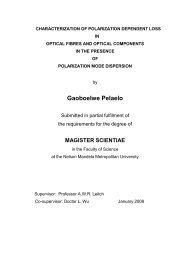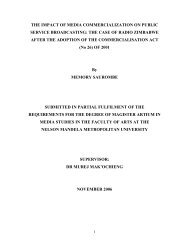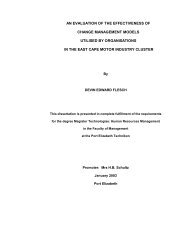CULTURE SHOCK - Nelson Mandela Metropolitan University
CULTURE SHOCK - Nelson Mandela Metropolitan University
CULTURE SHOCK - Nelson Mandela Metropolitan University
Create successful ePaper yourself
Turn your PDF publications into a flip-book with our unique Google optimized e-Paper software.
had gone to great lengths to invite others to meet you. If the invitation is extended toyou on the spur of the moment and for immediate use, one should just ensure it is notinconvenient and then jump at the chance to enjoy new company.Many South African people will invite one to ‘pop in’ whenever you like. Some willeven suggest you need not bother to phone first. This is often well meant, but untilyou know their family routine, one should call ahead. Arriving at the children’s bathtime can be a bit of a strain on your host, or just ‘popping in’ when they are about tosit down to a meal could be embarrassing.Generally, entertaining South African style revolves around a lot of chit-chat andsome ‘breaking of bread’. If one is invited to do something more formal, like playtennis or a game of bridge, you will usually be told in advance. Since there are asignificant number of private swimming pools in the country, one could just as wellbring along your swimsuit and a towel, especially in the summer.The Official LanguagesBefore the advent of democracy in 1994, English and Afrikaans were South Africa’stwo official languages. This meant that absolutely everything the government had ahand in – government documentation, all matters bureaucratic and all Parliamentarymatters – were conducted/communicated in either or both languages. Since 1994things have changed – there are now 11 official languages, and as can be expected, itis difficult to communicate everything in all of these.Most South Africans can speak either English or Afrikaans, in addition to one or moreof the indigenous languages such as Zulu, Xhosa, Sotho or Tswana. Quite often bothEnglish and Afrikaans are spoken, as South Africans have been taught theselanguages in schools for many decades. But it does not mean that everyone speaks orunderstands them well, so be patient, especially when it is obvious that it is not thespeaker’s native tongue.20















